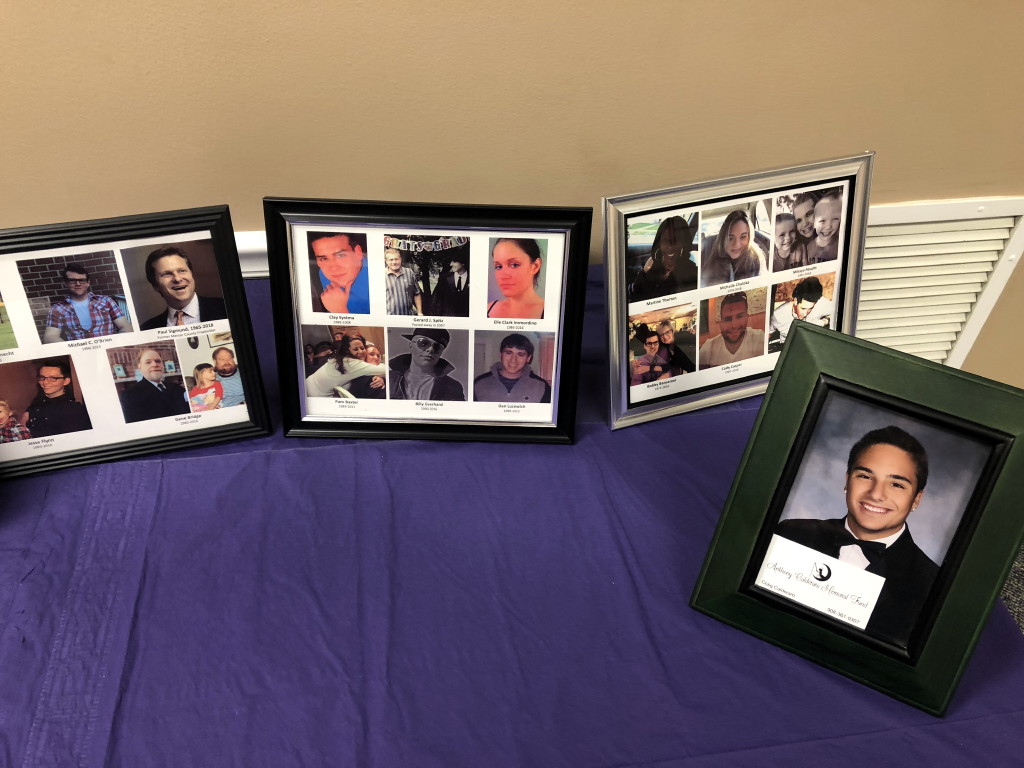When Dina Aurichio, of Branchburg, gave birth to her son Dillon on Nov. 23, 1994, she never thought she would be taking him off life support on his 24th birthday, days after a heroin overdose.
On Aug. 30, Somerset County community members and officials shared their personal stories related to addiction as part of International Overdose Awareness Day the following day.
In 2017, more than 72,000 people died from overdoses caused from opioids, such as heroin. In New Jersey alone, more than 1,669 people have died of drug overdoses so far in 2018 — that averages to about 8 deaths a day, according to the New Jersey Attorney General’s Office.
Somerset County Prosecutor Michael Robertson said New Jersey has the “purest” heroin in the country.
“When it comes over from overseas into the ports, it’s not cut, it’s not mashed with anything, so it’s in its purest state,” he said. “There are literally, every day [on Route 78] tractor trailers from California coming to get heroin and bringing it right back out. Every day, that’s what is going on in our state and in our county.”
The Aurichio family lived with Dillon’s addiction for six years, affecting their day-to-day lives — high on Xanax, he tripped and fell at his younger brother’s high school graduation, unknowingly breaking his foot.
Aurichio said she would often receive calls about her son from various police departments in the area, and at one point, Dillon was arrested for driving while high on Xanax and heroin.
The Aurichio family asked Dillon to move out, hoping it would motivate him to get clean, but it didn’t.
Although Dillon went to rehabs in Florida and a sober house in Montclair, he ultimately relapsed.
“Apparently dealers send people into sober homes to get new customers, and it worked,” Aurichio said.
Dillon lived on the street for three days, Aurichio said, and called a rehab facility in Monmouth County to receive treatment. After 28 days, he moved to an Oxford House in Ocean County, an area with one of the highest overdose rates at the time.
Dillon had planned to come back home on Nov. 21, but overdosed on Nov. 20. He died days later.
“Dillon was my first child — the boy who made me a mother,” she added, holding back tears. “[He was] the one who showed me what unconditional love is. I knew I could never love another person as much until I held him in my arms.”
Craig Calderaro, a fellow Branchburg resident, said he went through a similar battle with his son Anthony, but he first saw addiction in his then-wife, Linda.
The two married in 1992 and in 2003, Linda was diagnosed with bipolar disorder, depression and anxiety. She turned to alcohol to self-medicate.
She was in and out of rehab facilities for the next 10 years, Calderaro said.
“My kids grew up with a mother — when they were 6, 8 and 10 years old — who was a full-blown alcoholic,” he said. “They knew what addiction was about.”
The two divorced in 2014, and Linda was preparing to go to a program in Syracuse, New York to help with her addiction. Along the way, Calderaro said, she picked up heroin. In Feb. 2014, Calderaro received a phone call from Linda, who was being admitted into the hospital for pneumonia. Ten days later, she died from breathing problems and had heroin in her system.
Despite his efforts to steer his children away from the same path as their mother, Calderaro’s son Anthony fell into a similar pattern with addiction.
Just a few months after his mother’s death, Anthony was staying at a hotel, snorting heroin, shaking and throwing up. After obtaining at-home drug tests and testing his son two times a day over the course of a few months, Calderaro received an ambulance bill. Anthony had overdosed in Delaware, went to the hospital and signed himself out.
“When I got that bill, that was the day the cops were pulling in the driveway saying they found him dead in a hotel in Fort Washington, Pennsylvania,” he said. “In six months, a child that was in perfect shape — he wasn’t your typical 21-year-old partier in college — called us from a diner and said, ‘I’m not coming home tonight, we’re working late.’ And that’s when the cops say they find him dead.”
Calderaro has since established a foundation in his son’s name, which raises awareness of opioid-related overdoses. In 2017, he donated $6,000 to opioid and heroin addiction programs in Somerset County, as well as $3,000 to the Bridgewater Sheriff’s Department. The foundation has plans to expand, donating money to surrounding towns’ police departments.
The event also highlighted residents who have overcome addiction, like Jennifer Sorensen, Somerset County municipal alliance coordinator, who has been drug-free for more than nine years, and Recovery Support Center Coordinator Krishan Clemente, who celebrated three years of sobriety on Aug. 31.
Rev. Tim Wolf, a pastor at New Horizon Christian Fellowship in Hillsborough and director of Pioneer Family Success Center, expressed the importance of the event, saying it is part of the township’s efforts to “reduce the stigma of drug-related deaths.”
“This night acknowledges the terrible grief felt by families and friends remembering those who have been met with death or permanent injury because of an overdose,” he said.
After opiates affected local Somerset County families — and thousands of others across New Jersey and the country — Aurichio and Calderaro hope people realize that addiction does not discriminate.
Calderaro recalled a time when a woman came up to him after a speaking engagement in Bridgewater who said, “we don’t have a heroin problem here.” He said that mentality will “stop us from turning the curve” of the number of drug-related deaths.
Aurichio added, “Our system is broken; we’re losing more of our children every day, and something has to change. We have to make our voices loud enough to make that change happen.”

